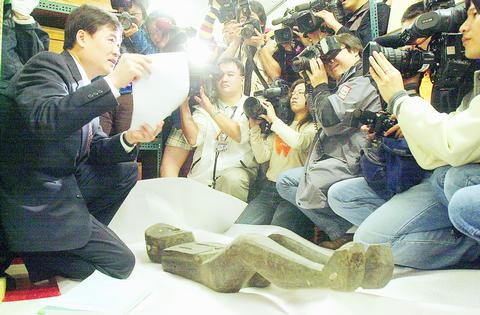DPP legislator Chen Chin-jun (陳景峻) yesterday said he suspects that some of the staff members of the National Taiwan Museum have helped to steal some of the museum pieces.
He said that a large number of Taiwanese cultural relics are missing from the museum's store rooms.
"According to my understanding, there are staff members within the museum who are collaborating with outside antique merchants," said Chen, during his inventory visit to the museum's storage area, located on Taipei City's Chingtien Street.

PHOTO: CHIANG YING-YING, TAIPEI TIMES
By Chen's request, James An (安奎), director of the National Taiwan Museum, and Wu Mi-cha (吳密察), vice chairman of the Council for Cultural Affairs, were also present at the site during Chen's inventory visit yesterday.
"It is unacceptable," Chen said as he spoke of the museum's dismal inventory monitoring practices.
"Based on the inventory list I have here, there are at least a thousand historical and cultural relics that are missing from the museum's store room -- some of these are being replaced," said Chen.
He added that relics such as weaponry, paintings and Aboriginal crafts comprised most of these pieces.
"For example, according to the inventory list, there is supposed to be one original Aboriginal costume from early in the last century. But now the original is missing and has been replaced with a modern reproduction," he said.
"It has been almost fifty years now [since the museum was taken over from the Japanese]," Chen said. "Yet, in all this time, the museum still hasn't finished listing items that are included in a collection of more than 25,000 relics contained in this storage room."
Chen based his estimate on historical figures that describe how the museum, Taiwan's oldest, was taken over from the Japanese in 1945 with approximately 50,000 cultural and historical relics.
"It is just simply ridiculous that all these cultural relics are locked inside the storage room instead of being out there in the museum for public display and appreciation," Chen said.
In response to the dissatisfaction that Chen expressed over the way the museum managed its collection, Wu said that the council would assign a task force within the next week to look into the matter.
Meanwhile, An said that it is his goal to completely finish the museum's inventory work within the next two years -- as well as to improve the condition of the storage room.
"Since the inventory work has not been finished, I cannot say for certain if museum members have done anything [illegal]," An said.
"However," he added, "if it is found that illegal dealings have taken place, the museum would definitely not hide it from the public."

Alain Robert, known as the "French Spider-Man," praised Alex Honnold as exceptionally well-prepared after the US climber completed a free solo ascent of Taipei 101 yesterday. Robert said Honnold's ascent of the 508m-tall skyscraper in just more than one-and-a-half hours without using safety ropes or equipment was a remarkable achievement. "This is my life," he said in an interview conducted in French, adding that he liked the feeling of being "on the edge of danger." The 63-year-old Frenchman climbed Taipei 101 using ropes in December 2004, taking about four hours to reach the top. On a one-to-10 scale of difficulty, Robert said Taipei 101

Nipah virus infection is to be officially listed as a category 5 notifiable infectious disease in Taiwan in March, while clinical treatment guidelines are being formulated, the Centers for Disease Control (CDC) said yesterday. With Nipah infections being reported in other countries and considering its relatively high fatality rate, the centers on Jan. 16 announced that it would be listed as a notifiable infectious disease to bolster the nation’s systematic early warning system and increase public awareness, the CDC said. Bangladesh reported four fatal cases last year in separate districts, with three linked to raw date palm sap consumption, CDC Epidemic Intelligence

Two Taiwanese prosecutors were questioned by Chinese security personnel at their hotel during a trip to China’s Henan Province this month, the Mainland Affairs Council (MAC) said yesterday. The officers had personal information on the prosecutors, including “when they were assigned to their posts, their work locations and job titles,” MAC Deputy Minister and spokesman Liang Wen-chieh (梁文傑) said. On top of asking about their agencies and positions, the officers also questioned the prosecutors about the Cross-Strait Joint Crime-Fighting and Judicial Mutual Assistance Agreement, a pact that serves as the framework for Taiwan-China cooperation on combating crime and providing judicial assistance, Liang

US climber Alex Honnold left Taiwan this morning a day after completing a free-solo ascent of Taipei 101, a feat that drew cheers from onlookers and gained widespread international attention. Honnold yesterday scaled the 101-story skyscraper without a rope or safety harness. The climb — the highest urban free-solo ascent ever attempted — took just more than 90 minutes and was streamed live on Netflix. It was covered by major international news outlets including CNN, the New York Times, the Guardian and the Wall Street Journal. As Honnold prepared to leave Taiwan today, he attracted a crowd when he and his wife, Sanni,